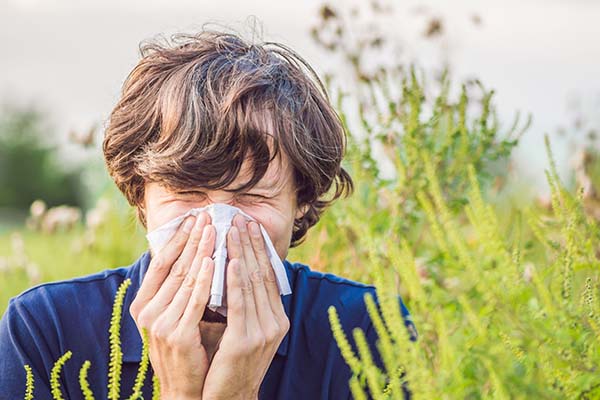What Are Allergies?
One of the marvels of the human body is that it can defend itself against harmful invaders such as viruses or bacteria. But sometimes the defenses are too aggressive, and harmless substances such as dust, mold or pollen are mistakenly identified as dangerous. The immune system then rallies its defenses, launching a host of complex chemical weapons to attack and destroy the supposed enemy. In the process, some unpleasant and, in extreme cases, life-threatening symptoms may be experienced by the allergy-prone individual.

What Are the Causes of Allergic Reactions?
There are hundreds of ordinary substances that can trigger allergic reactions. Among the most common are plant pollens, molds, household dust (dust mites), animal dander, foods, medicines, feathers and insect stings. These triggers are called “allergens.” An allergic reaction may occur anywhere in the body, but usually appears in the skin, eyes, lining of the stomach, nose, sinuses, throat and lungs – places where special immune system cells are stationed to fight off invaders that are inhaled, swallowed or come in contact with the skin.
Who Develops Asthma and/or Allergies?
Asthma and allergies can affect anyone, regardless of age, gender, race or socioeconomic factors. While it is true that asthma and allergies develop more commonly in children, they can occur for the first time at any age or, in some cases, recur after many years of remission. Although the exact genetic factors are not yet understood, the tendency to asthma and allergies is linked to heredity. In susceptible people, factors such as hormones, stress, smoke, perfume or other environmental irritants may also play a role.
Allergy Shots
An allergy shot contains a very small amount of the substance that you are allergic to (called an allergen). Common allergens include mold, house dust mites, cat and dog dander, and pollen from trees, grasses, and weeds.
How do Allergy Shots Work?
Allergy shots help your body build a tolerance to the allergens that cause you symptoms. Over time body reacts less to the allergen and your allergy symptoms become less severe. Consequently, you will need little to no medicine. In addition, by doing this long enough, this relief may become permanent.
Allergy shots work well for allergic asthma, pollen allergies (also called allergic rhinitis or hay fever), house dust mite allergies, cat and dog allergies, eye allergies, and bee-sting allergies.
You will start getting shots one time each week. After 6 – 8 months of weekly shots, your doctor will decide when you can start on maintenance treatment. Maintenance shots are usually given just once each month, year-round for approximately 3 – 5 years.
Advanced Cluster Immunotherapy
Chestnut Hill Allergy & Asthma Associates was among the first practices in the region to provide Advanced Cluster Immunotherapy.
Cluster immunotherapy accelerates the timetable for patients to achieve clinical benefits, shortening the timeframe to just 3 – 4 months instead of the traditional treatment time of 6 – 8 months.
During an office visit, patients receive a shot every 15 minutes, achieving a month’s worth of shots in just one to two visits. The compressed treatment program results in patients experiencing relief and reaching the maintenance phase faster.
Are Allergy Shots Harmful?
Allergy shots are usually safe. But because allergy shots contain small amounts of an allergen you might have an allergic reaction to the shot itself. One common reaction to allergy shots is swelling at the place where the shot is given.
Some people can also have severe, shock-like reactions to an allergy shot. This type of reaction is called anaphylaxis. Anaphylaxis is rare but very serious. If you get your shots on schedule (every week or every month), you’re less likely to have this kind of reaction.
In case you have a bad reaction, your doctor will have you stay at the office for about 20 minutes every time you get your shot. That way, if you have a reaction to the shot, your doctor can give you something right away to stop it.
It usually takes 6 – 8 months or more of shots before you start feeling better and notice relief of your allergy symptoms. If you don’t feel better after this time, you should probably talk with your doctor about another kind of treatment for your allergies.
